ga1 [gá] vb. to serve: ọ ga mwẹn la
ukpo eha ― “He served me for three
years.”

ga2 [gá] vb. to be cooked; to be ready
to eat. Iyan na gae ne ― “This yam
is cooked.”

gaa [gàá] vb. to surround; to encircle
(also lẹgaa; gaga).

gadagbaa [gádágbáá] adj.; adv. (usu-
ally introduced by the verb ye) huge;
expansive.

gaga1 [gàgá] vb. cf. gaa.

gaga2 [gàgá] vb. 1. to manage; to cope
with limited means. 2. to care for;
to look after: Rẹn ẹre ọ gagae khian ―
“He is the one tending him.”
%%

gaigai [gàigài] adv. describes a manner
of walking: with wide confident
strides.

gaingain [gã̀ĩgã̀ĩ] adv. describes gait:
with an air of arrogance.

gegeege [gégéégé] adv. (usually in-
troduced with the vb. ye): describes
something that is in a heap, that is,
so plentiful that it is in a heap: Ize
ne ọ dẹe ye gegeege ― “The rice
she bought is in a heap.”
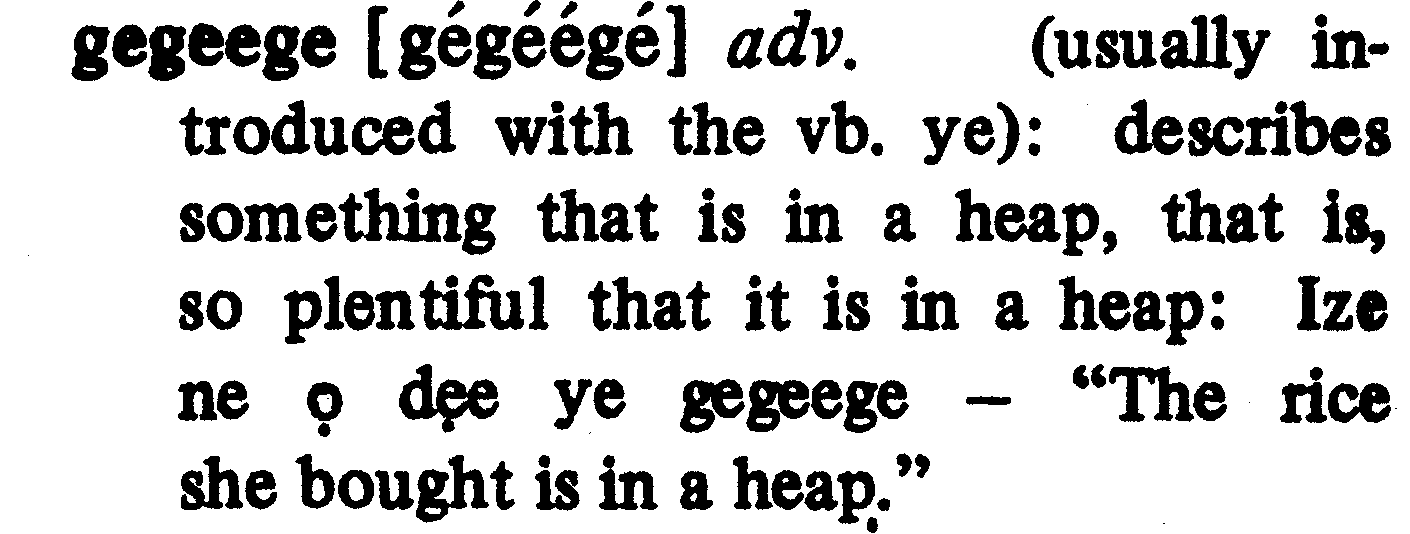
gele [gèlè] adv. really; indeed; actual-
ly: Ọ gele sẹ evba ― “He actually
reached there.”

gelegele [gèlègèlè] adv. in fact; in
truth.

geletee [gélétéé] adv.; adj. (usually in-
$Page 049$

troduced by the vb. yo, or ye), de-
scribes height, very high (also golotoo).

gẹdẹgbẹẹ [gɛ́dɛ́gbɛ́ɛ́] adv.; adj. (usu-
ally introduced by the vb. ye) de-
scribes size: very big, very bulky.

gẹdẹgẹdẹ [gɛ̀dɛ̀gɛ̀dɛ̀] adv. usually
used as an emphatic modifier after
personal prons.: me gẹdẹgẹdẹ?:
“my very self?” i.e. do you actually
mean me?

gẹngẹnẹngẹn [gɛ̃́gɛ̃́ɛ̃́gɛ̃́] adv. (usually
introduced by the vb. ye) very tight;
bloated ― Ẹko ẹre ye gẹngẹnẹngẹn ―
“His belly looks bloated.”

gẹnnẹ [gɛ̃́nɛ̃́] adv. not at all: Erhọkpa
ma de fua gẹnnẹ ― “None dropped
at all.”

gi [gí] vb. to allow to do; to permit
to do, to let: Ọ gi Ozo la owa ― “He
let Ozo enter the house”. It has a
variant gu when the object is 1st or
2nd pers. sg. pro.: Ọ gu mwẹn la
owa ― “He let me enter the house.”
2. to be able (to do something).
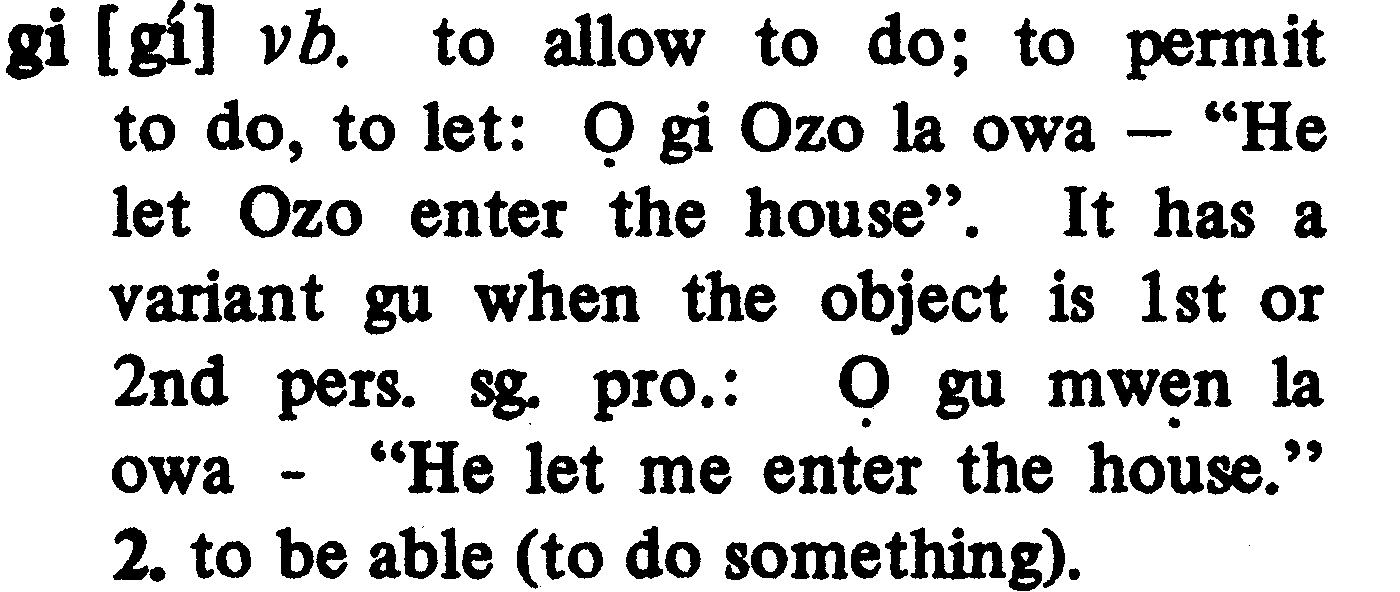
gia [gìá] vb. plural or reiterative sense of
fian: 1. to cut into several parts or
pieces; 2. to cut several objects; 3.
several people cut the same object;
several people cut various objects.
(also giagia).
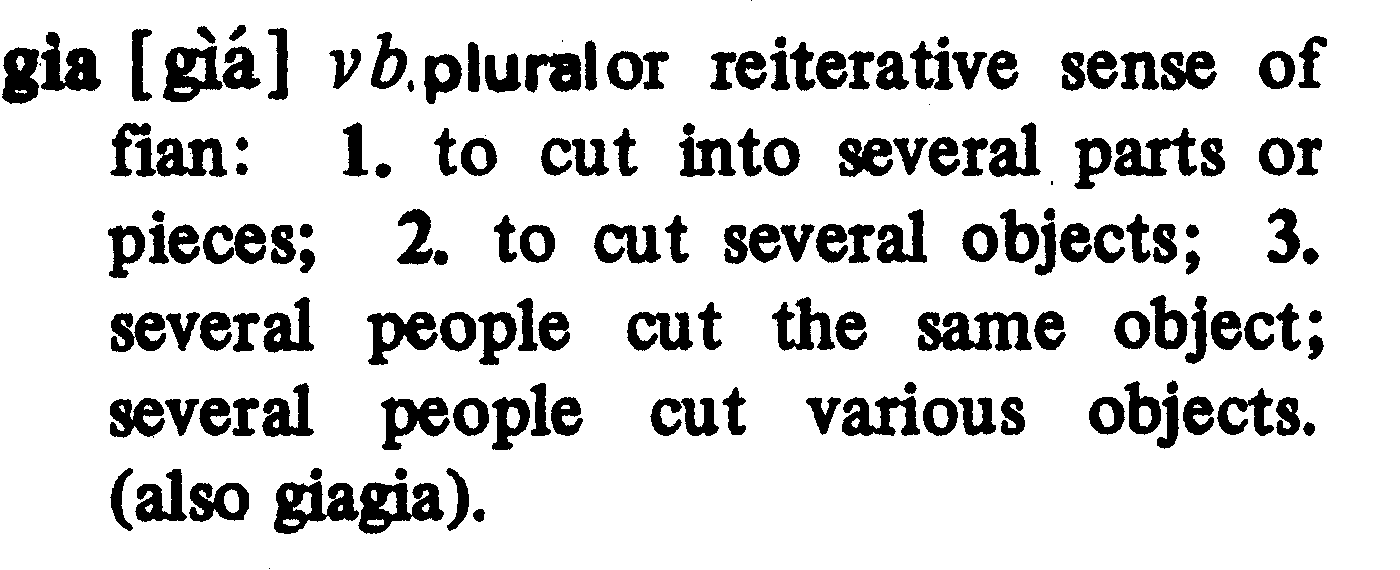
giagia [gyàgyá] vb. cf. gia.

giagha [gyàɣá] vb. to cut or tear into
shreds or little pieces. Ọ giagha
ukpon ye ọre ẹkun ― “He tore her
cloth into shreds on her waist”^: “He
tore the cloth she wrapped around
her waist into shreds.”
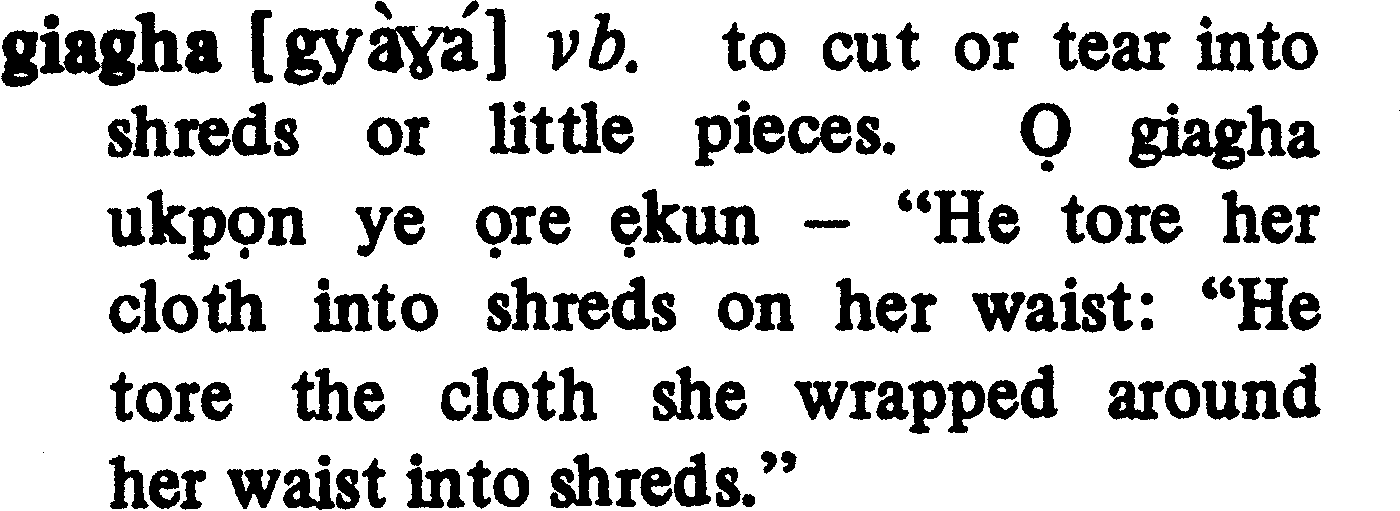
giangiangian [gỹã̀gỹã̀gỹã̀] adv.; adj.
(usually introduced by the verbs,
baa or ye) very bright; brightly-
%%

coloured.

gianranran [gỹã̀ɽã̀ɽã̀] adv.; adj. 1.
(with the verb tu): describes sound:
the cry of a very young infant, es-
pecially at birth or during a bath; 2.
(with ye): describes size: very tiny
and numerous.
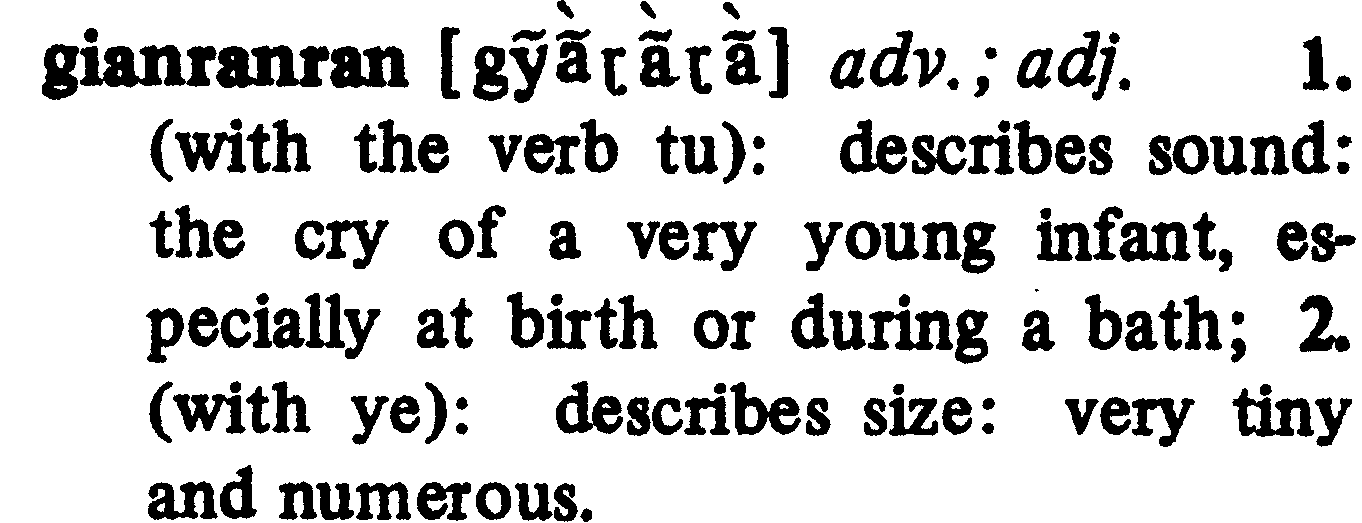
giasẹn [gìásɛ̃̀] vb. “to spit saliva”: 1.
to spit; 2. to pronounce a curse or
evil wish on a person.

gidigbo-gidigbo [gídígbògídígbò] int.
a formula pronounced at the initia-
tion of a wrestling match by one of
the contending pairs.

gidigidi1 [gìdìgìdì] adj.; adv. (usu-
ally introduced by the verb ye) de-
scribes size: big and thick or strong
(e.g. of yams; or human legs).

gidigidi2 [gìdìgìdì] adv.; adj. (usu-
ally introduced by the verb baa)
describes flame: blazing hot.

gidigbi [gìdìgbì] adv; firm and strong.

gie [gyé] vb. to send: Ọ gie ẹre Ẹdo
― “He sent him to Benin.”

gie1 [gìé] vb. to describe; to show:
Ọ gie odẹ ma mwẹn ― “He described
the road to me; he showed me the
way”.

gie2 [gìé] vb. to compare: (usually
occurs with a pre-verb ya) Ya ọna
gie ọnii ― “Compare this with that.”

gie3 [gìé] vb. to spit (e.g. of a snake
such as the spitting cobra).

gie4 [gìé] vb. to affect (of certain
sickness): Uruvba gie ẹre akharha ―
“Boil has affected his thigh: he has
a boil on his thigh.”
$Page 050$

gie [gyè] prep. indicates a direction:
towards; to: Rhie ígho gie Ozo ―
“Take the money to Ozo”.

giẹ1 [gyɛ́] vb. to laugh.

giẹ2 [gìɛ́] vb. to rip off, or tear off:
abọ ukpọn mwẹn giẹre ― the edge
of my cloth has ripped off.

giẹgiẹ1 [gyɛ̀gyɛ́] vb. to tear to bits;
to break into pieces.

giẹgiẹ2 [gìɛ́gyɛ̀] vb. to make haste; to
be fast: giẹgiẹ rri ọre ― “Eat it fast.”

giẹghẹ [gyɛ̀ɣɛ́] vb. to be small (of
many objects), in size, rather than
quantity: tiny.

giẹghẹgiẹghẹ [gyɛ̀ɣɛ̀gyɛ̀ɣɛ̀] adj.; adv.
(usually introduced by the verb, ye)
describes size: very small; tiny. (of
many objects). (also giẹnrẹn or giẹrẹ).

giẹn [g̃ɛ̃́] vb. to burn.

giẹngiẹn [gỹɛ̃̀gỹɛ̃́] vb. 1. to have low
endurance or tolerance for pain or
physical discomfort: Egbe giẹngiẹn
mwẹn gbe ― “My body cannot endure
much pain.” 2. to be hypersensitive.

giẹnrẹn [gỹɛ̃̀ɽ̃ɛ̃̀] adj.; adv. (usually in-
troduced by the verb ye): very small;
tiny, (of many objects). (also
guẹnrẹnrẹn).

giẹrẹ [gyɛ̀ɽɛ̀] adj.; adv. cf. giẹnrẹn.

gilọgilọ [gílɔ́gílɔ́] adj.; adv. (usually
introduced by the verb ye) describes
appearance: tall and thin. (also fiofio).

gin [gĩ́] vb. to leak.

ginna [gĩ̀nã́] adv. against; to: Ọ gba
ẹre ginna erhan ― “He tied
him to a tree”.
%%

giogiogio [gyògyògyò] adj.; adv.
(with the vb. baa) bright red. 2. (with
the vb. tọn). very hot.

girri/grri [gìrì/grì] adv. describes mo-
tion: sudden or unexpected motion.

go [gó] vb. to shout, to scream (also
so).

gogoogo1 [gógóógó] adj.; adv. (with
the verb, so): describes noise: very
loud. 2. (with the verb yo): very
high.

gokaan [gókã́ã́] adv.; adj (usually with
the verb ye) describes appearance:
very tall and clumsy.

golotoo [gólótóó] adv; adj. (usually with
the verb yo or tan) very tall.

gọ [gɔ́] vb. (in the active sense): to
bend or curve; (in the stative sense):
to be bent, curved or crooked.

gọlọ [gɔ̀lɔ́] vb. to walk gracefully.

gọlọgọlọ [gɔ̀lɔ̀gɔ̀lɔ̀] adv. describes a
manner of walking: with graceful
gait.

gọn-ugie [gɔ̃̀ṹgyè] vb. to worship; to
hold the festival of.

gọngọnọngọn [gɔ̃̀gɔ̃̀ɔ̃̀gɔ̃̀] adv; adj. des-
cribes appearance: pointed or angular.

gu1 [gú] ?. co-verb to accompany in doing;
to help in doing: Ọ gu erhae winna ―
“He worked with his father.”

gu2 [gú] vbl part cf. gi.

gu-dẹ [gùdɛ́] vb. “to help buy”: 1.
to assist in buying; 2. to buy from.

gu-dia [gùdìá] vb. to live with (usually
as a ward or servant).
$Page 051$

gu-guan [gùgũ̀ã́] vb. to speak with;
to speak to.

gu-gui [gùgwí] vb. “to quarrel with”:
to scold; to query.

gu-gbinna [gùgbĩ̀nã́] vb. “to fight
with”.

gua1 [gùá] vb. 1. to adulterate; 2^.^ to
admix (also guagua).

gua2 [gùá] vb. (< guẹ-vbe-a-ya): to
know how (to do something); always
occurs as a first member of serial verb
constructions. (also guara).

gua1 [gwá] vb. to row (a boat). (also
guokọ).

gua2 [gwá] vb. 1. to dig; 2. to plant
pieces of yam or cassava in prepared
heaps of soil.

gua3 [gwá] vb. (of space) to be capable
of accommodating; to have enough
room for. Emwanna gha gua ima ―
“This place can accommodate us.”

gua4 [gwá] vb. (with ehien) to scratch
or tear (with finger nails).

gua5 [gwá] vb. (with kpaọ) to rise; to
swell.

gualọ [gwàlɔ́] vb. 1. to look for; to
search; Ọ gha gualọ igho ― “He is
looking for money” (also hoo).

guagua [gwàgwá] vb. to admix (cf.
gua1 (vb)).

guan [gũ̀ã́] vb. to speak; to say some-
thing.

gue1 [gùé] vb. 1. to cover; to put a
lid on; 2. to shut; to close: Ọ gue
unu nẹ ― “He has shut mouth: he
has shut up.”
%%

gue2 [gwé] vb. 1. to be located with;
2. to be in possession of. Ebe mwẹn
gue Ozo ― “My book is with Ozo.”
Igho i gue mwẹn ― “Money is not
with me: I have no money”.

guemwin [gwèɱĩ́ĩ̀] vb. “^to know some-
thing”: to be skilled; to be proficient.

guero [gwèɽó] vb. (< guẹ ― ero) “to
know tricks”: to be cunning.

guẹ [gwɛ́] vb. to know; to be skilled
at something.

gue [gùɛ́] vb. to make sacrifice to
one’s head during the Iguẹ ceremony;
(also ruhunmwun).

guẹnrẹnrẹn [gwɛ̃̀ɽɛ̃̀ɽɛ̃̀] adj.; adv. (cf.
giẹghẹgiẹghẹ).

guẹzẹ [gwɛ́zɛ̀] vb. “to row river”: to
cross a river by boat.

guẹzẹguẹzẹ [gwɛ̀zɛ̀gwɛ̀zɛ̀] adv. (usu-
ally with the verb rhia or kulo): de-
scribes degree: completely; totally;
entirely. Ọmọ na wa kulo guẹzẹguẹzẹ
― “This child is spoiled completely.
i.e. The child is very badly behaved.”
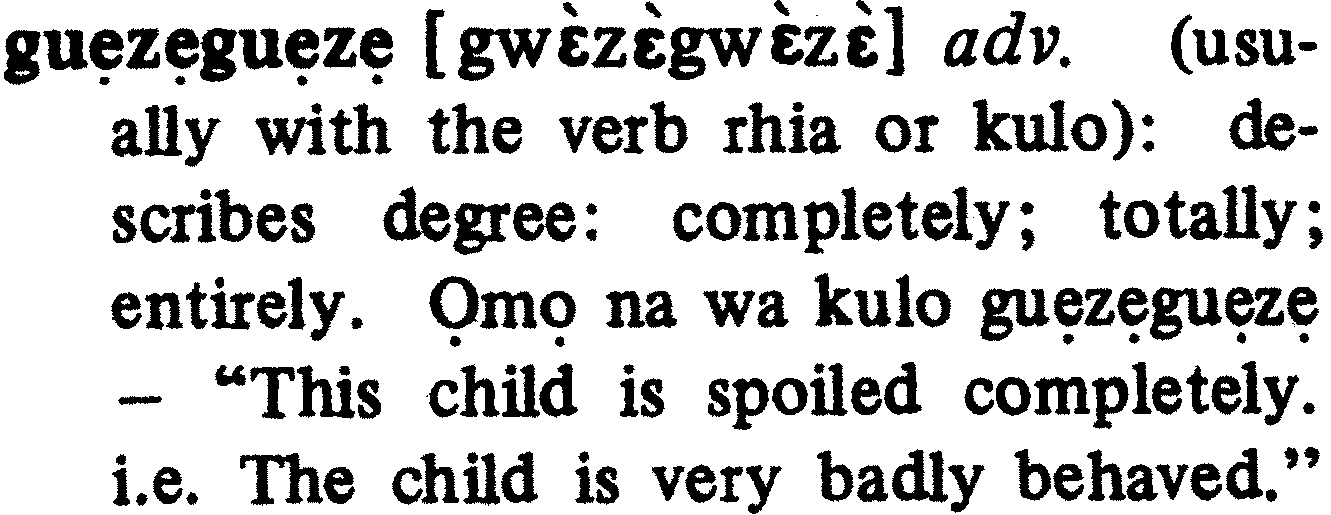
gui1 [gwí] vb. 1. to quarrel; to have
a disagreement. ma vbe ọre gui ―
“He and I are quarrelling”; 2. to
complain; to be displeased with: Ọ
gui ighẹ i ma tuẹ ọre ― “He is com-
plaining that I did not greet him”;
3. to state one’s case (in a quarrel):
Ọ ghi gui oghẹe ne, mẹ na vbe gui
ọghomwẹn ― “After he had stated
his case, I then stated mine.”
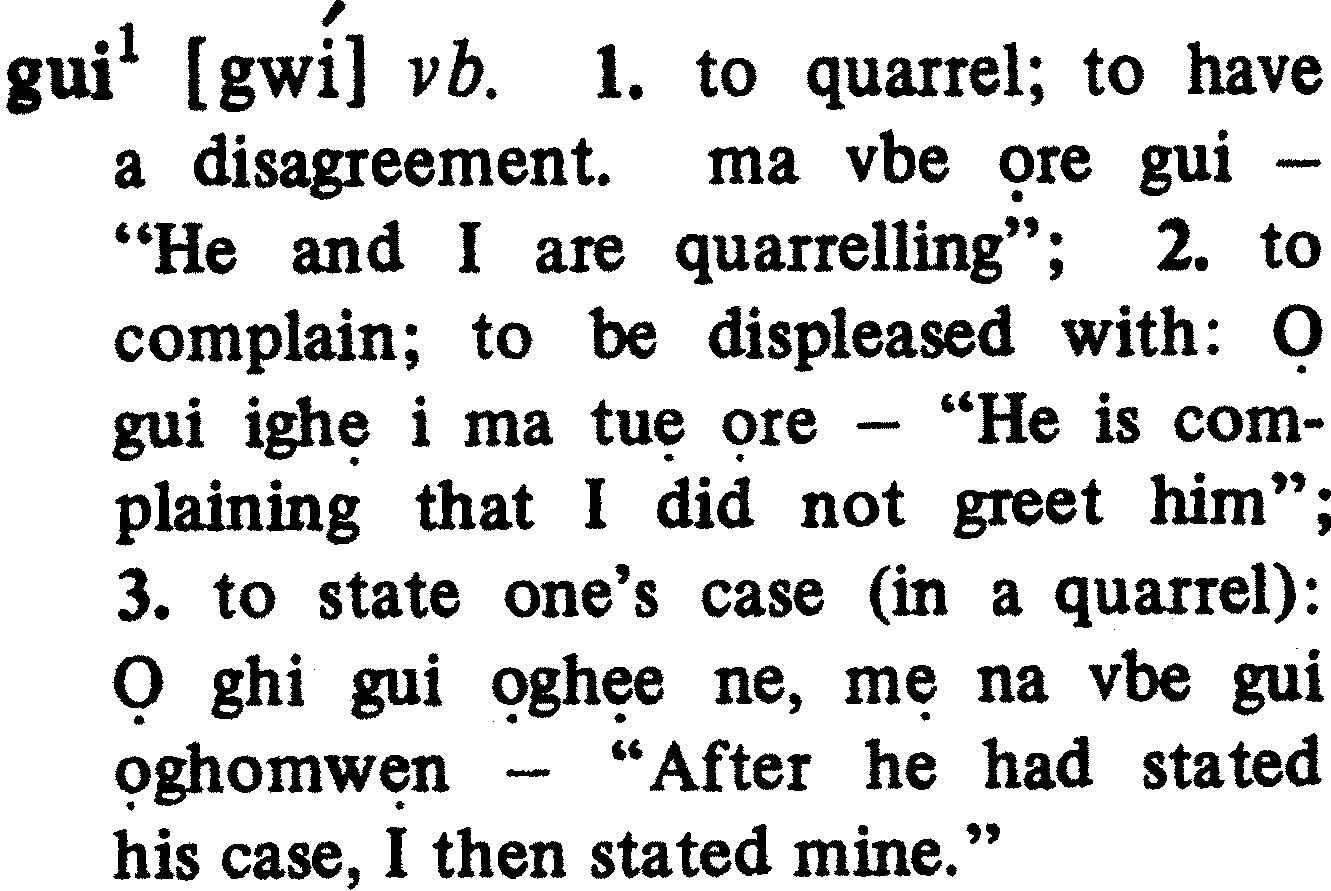
gui2 [gwí] vb. to drone; to mutter
indistinctly.

guiẹzo [gwyɛ́zɔ] vb. 1. (< gui-ẹzo) to
argue a case. 2. to complain.
$Page 052$

gukaan [gùkã̀ã̀] adj.; adv. (with tota):
clumsily, as if collapsing.

gulugulu [gúlúgúlú] adj.; adv. (usu-
ally with dinmwin or ye) very deep;
(of eyes): sunken.

gunu [gùnṹ] vb. “to shut mouth”: to
keep quiet; to shut up.

guo [gùó] vb. to collapse; to break
down.

guobọ [gwòbɔ́] vb. “to know hand”:
to be accustomed to; to understand
(somebody or something).
%%

guokọ [gwòkɔ́] vb. to row or sail a
boat.

guọ [gwɔ́] vb. to tremble; to shiver.

guọghọ [gwɔ̀ɣɔ́] vb. 1. (in the transitive
sense): to break; to crush; to pull
apart; 2. (in the intransitive sense):
to be broken; to get crushed or
crumpled.

guọnmwengbe [guɔ̃̀ɱẽ̀g͡bé] vb. to
turn away abruptly (as if in protest).

guọnmwẹn [guɔ̃̀ɱɛ̃́] vb. 1. to move
abruptly or suddenly; 2. (of a dog’s
tail): to wag.
